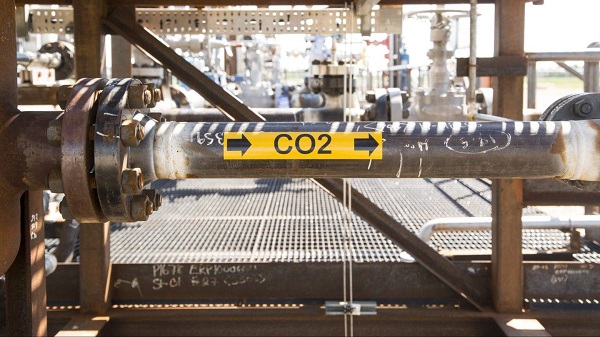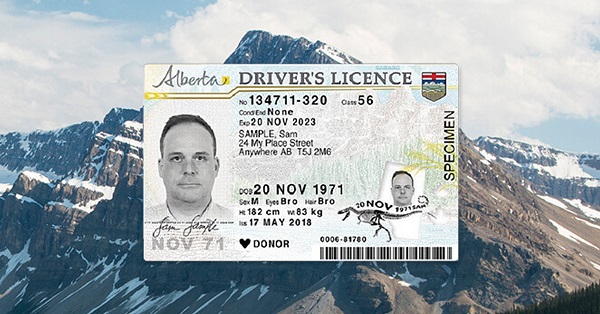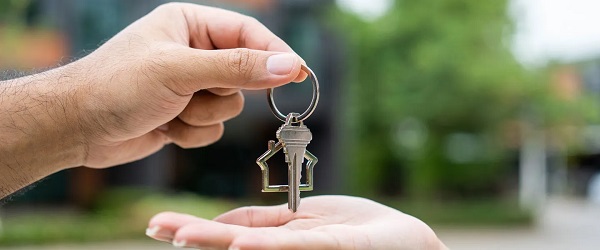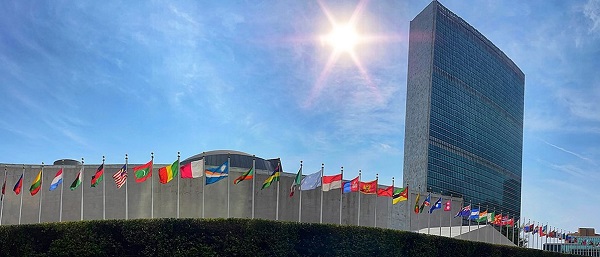Alberta
Six stories from local soldiers who have deployed internationally in the past year

In the year that has passed since the last Remembrance Day, six soldiers from our local army units have deployed on international missions to Ukraine, Lebanon, and Latvia. They were asked a series of questions recently to get a sense of what they do on these missions and what they’ve learned, both about themselves, their mission, and the countries that they deployed to.
By way of background, Red Deer’s Cormack Armoury is home to 41 Signal Regiment, (2 Squadron), a communications unit, and 78th Field Battery, an artillery unit, along with army, air, and sea cadets.
The following are transcripts of interviews with each of them upon their return.
Major (Maj) James Gascoyne, 41 Signal Regiment

Major Gascoyne deployed to Ukraine
Mission name and country deployed to: Operation UNIFIER, Ukraine (Ukraine is situated in the central part of Eastern Europe, on the crossroads of major transportation routes from Europe to Asia and from the Scandinavian states to the Mediterranean region).
Dates deployed: October 2019 – April 2020
Job/role while deployed: Staff Officer to the Defense Review Advisory Board in Kiev and later Staff Officer with the Task Force Headquarters.
First impression when arriving “in country”: Central Ukraine had temperate climate and countryside appeared similar to central Alberta. Visible contrast between new and old infrastructure. Modern buildings next to decades old Soviet era apartment buildings.
What are 3 good memories you have from your mission:
- Strong relationship with the people I worked with from Ukraine and other supporting countries
- Lasting friendships with members of my task force that I served with on Operation UNIFIER
- Being involved in the development of democratic institutions and watching a country grow.
Challenges you faced during deployment: Language barrier. The pandemic occurred towards the end of my deployment, resulting in much of the work in Kiev coming to a halt because of the closure to international travel and restrictions on the work place.
How did your deployment help/hurt your civilian employment/studies? My employer was supportive and I was able to return to my position.
What do you remember from when you arrived back in Canada? I was quarantine for two weeks at a CAF air force base before I could return home. This was actually beneficial as it gave me a chance to decompress before returning to civilian life.
Did you face any challenges when you returned from deployment? Being isolated due to the pandemic was difficult. When there was an opportunity to work for the Brigade during the spring and summer, I signed up right away.
Does Remembrance Day feel any different this year being the first one since your return? Last November I took part in a large multi-national ceremony in Kiev. This year, the restrictions on gathering will likely prevent CAF from participating in public.
What should Canadians think about this Remembrance Day? Democracy does not come free. The fight against corruption, autocracy, and apathy continues today.
Corporal (Cpl) Shane R. Kreil, 41 Signals Regiment (2 Sqn)

Cpl Kreil deployed to Latvia
Mission name and country deployed to: Op Reassurance – Latvia (Latvia is in north-eastern Europe with a coastline along the Baltic Sea. It borders with Estonia, Russia, Belarus and Lithuania)
Dates deployed: 10 Jan 2020 – 10 July 2020
Job/role while deployed: Communications Operator in Rear CP and RRB Dets
First impression when arriving “in country”: Latvia is a beautiful – lush green forest covered country – reminds me most of the province of British Columbia with its tall trees and proximity to the Ocean. The people are relatively tall and slender and as a whole, generally friendly. There did seem to be a large number of run-down buildings in less densely populated areas indicative of the Cold War era pre-Latvian independence.
What are 3 good memories you have from your mission:
- The only RRB (Radio Rebroadcast) Exercise that my detachment of 3 soldiers went on was a solid moment for us – a confirmation of skills and faith in our ability to do our job well and independently. The freedom felt at that moment in time wherein we were away from the main battlegroup and left to our own devices was fantastic. It showed us that leadership had confidence in us and proved to ourselves that we could do whatever was required in that role.
- PSP Staff (Civilians hired to run certain tasks around camp) had put on a number of excursions to the surrounding area where we were able to see what Latvia and its culture were all about – one of these was a tour to the KGB museum. It was a fantastic eye-opener that gave us a glimpse into what happened to Latvian citizens during occupation and a feeling as to why they do not want to undergo similar circumstances ever again – hence the integration with NATO. This cultural awareness was a fantastic memory.
- Once again PSP was in the job of creating lasting memories – they hosted a number of Bingo events – these brought a sense of “home” to those deployed in Latvia and helped with bringing nations together – in particular relations with the Spanish who were very boisterous and enthusiastic when it came to Bingo.
What are 3 challenges you faced during deployment:
- COVID 19 was by far the biggest kick for us – I had only JUST begun my mid-tour leave – flew to Dublin, Ireland where I was to spend the next two weeks with family. Very little was out of place the first half day there though there was much talk of closure of certain events. The next day was almost surreal on a guided bus tour – going past the Guinness Factory a few days before St. Patrick’s Day – and it was CLOSED. That was the first indicator we had that this was incredibly serious and impactful – that night as I was on the phone with the family wishing them a safe flight over I got a call telling me I was being recalled to Latvia in the morning – it was heartwrenching calling the family back to tell them NOT to board the plane as I would not be there when they arrived. The next two weeks were spent in quarantine in Latvia and the remainder of the tour felt very different.
- It was difficult to intermingle with NATO personnel at times from other nations due to the difference in spoken languages, both during exercises and during off time. Though this was a challenge it was an excellent opportunity to discover ways to communicate with people whose native language is not English.
- One last major hurdle was not actually in the deployed environment but instead on the home-front. With the world being turned upside down due to Covid 19 in addition to other family matters (deaths, weddings, other personal issues that arose) it was very difficult to be in a virtual bubble in Latvia while the rest of my family had to deal with everything happening in Canada. Due to the remote location we live in there was very little in the way of support services my family could call on to assist which compounded the stresses on both family and me as a deployed member.
How did your deployment help/hurt your civilian employment/studies? Due to deployment I had essentially farmed my job out to a number of other individuals in order to keep things running during the slow season. Unfortunately Covid happened and management decided that restructuring was required – as I was deployed I was unable to compete for any of the positions worked in nor able to provide directional feedback with pros/cons and impacts to business. Upon return to work in July just in time for a busy agricultural season I was promptly demoted and moved into a modified work schedule but with no impact to my pay – just responsibility. Not all for the worse – it means that working from home can be done without concern as to what is actually happening at the branch – major adjustment to way of thinking required is all.
What do you remember from when you arrived back in Canada? It was a late return – plane landed at 2300h in Edmonton – we had to sort baggage and transport all the way to the North end of Edmonton (Garrison) in order to meet personnel that were to transport us to our home unit and from there family would meet us. It also proved difficult communicating to the family as my phone was deactivated during my tour – so messages were being relayed through others. During deployment my Regiment had undergone a leadership change and the new CO/RSM were there to meet us at the garrison – by this time is was about 0200h. After being transported back to Red Deer to meet a very tired looking family it was about 0400h and back in my home town by 0545h. I am still getting used to seeing arrows on grocery store floors and using hand sanitizer with an insane frequency.
Did you face any challenges when you returned from deployment? Minus the work adjustment and getting used to different procedures being used by day to day business challenges upon return have been minimal.
Does Remembrance Day feel any different this year being the first one since your return? Undoubtedly Remembrance Day will be different this year – not only due to many Legions not holding an official ceremony due to Covid fears but a new respect for what our predecessors fought and died for is very real.
What should Canadians think about this Remembrance Day? As Canadians even though we have a diverse history and broad spectrum of personal experiences most of us were born in a free and unoccupied country and cannot fathom a daily struggle for freedom and independence that is happening in other countries around the world even today and has happened in generations past. I would encourage Canadians to really think deeply on what it means to be free and the sacrifices made by many people to keep it this way including time away from families, hardship and difficulty with daily tasks and the ultimate sacrifice when necessary.
Master Bombardier (MBdr) Rhett Quaale 78 Field Battery / 20 Field Regiment

Bdr Quaale deployed to Lebanon
Mission name and country deployed to: Operation Impact Lebanon (Lebanon is located in the Middle East and bordered by the Mediterranean Sea to the west, Israel to the south, and Syria to the east and north.
Dates deployed: 14 Dec 2020 – 16 March 2020
Job/role while deployed: Land Border Regt (LBR) Instructor. Our Job was to teach the Lebanese LBRs to work, move and survive in winter conditions. For instance LOSV, Improvised shelters, how to treat cold weather injuries.
First impression when arriving “in country”: It was a bit of a shock to see firsthand how different parts of the country were, from very poor (refugee camps) to very westernized.
What are 3 good memories you have from your mission:
- Improving my own skills for surviving winter conditions
- Making new friends both from Canada and Lebanon
- Getting to see parts of Lebanon that I probably would never see if not for my deployment.
What are 3 challenges you faced during your deployment:
- Language gaps made it difficult to train and trying to convey what we were trying to say through translators
- Working with a fairly new army who aren’t as well equipped as the CAF took some time to get use to
- Being away from friends and family through life events
How did your deployment help/hurt your civilian employment/studies? I am employed full time by the CAF.
What do you remember from when you arrived back in Canada? I remember a sense of disbelief that I was home when I landed in Canada and I was very excited to see my wife and friends again.
Did you face any challenges when you returned from deployment? When I arrived back in Canada it was the beginning of COVID 19 and I had to stay isolated from people I hadn’t seen in months.
Does Remembrance Day feel any different this year being the first one since your return? I’ve always felt pride being a solider but having the opportunity to deploy has made me hold my head a little higher. I’m humbled still by the fact that there are many solders who didn’t make it back home.
What should Canadians think about this Remembrance Day?
Canadians should always remember soldiers stand for Canadian values both domestically and abroad, and that men and woman have died defending our values. As well, soldiers who have come back home with both physical and mental injuries that changed their lives forever. Remember that they went on deployment to represent Canada.
Corporal (Cpl) Courtney McKinley – 41 Signal Regiment, (2 Sqn)

Cpl McKinley deployed to Latvia
Mission name and country deployed to: OP REASSURANCE – Latvia
Dates deployed: 15 JUL 19 – 15 JAN 20
Job/role while deployed: Radio operator – Forward CP
First impression when arriving “in country”: My first impression was being confused by European road signs and lights. A red light flips back to yellow before it turns green! Besides that, wondering why the Latvians did not smile more because their country is beautiful!
What are 3 good memories you have from your mission:
- We did a road move with all the multi-national armoured vehicles through the Latvian countryside. It was nice to see the locals waving and taking photos. The trees in Latvia are the nicest I have seen.
- Another signaller and I went to Latvian elementary schools for Operation Radio Santa where we used our radio’s to “call the North Pole.” I was Santa’s signaller out in the van, who happened to be an old Latvian veteran, while my colleague played the Head Elf in the classrooms. I enjoyed spending a few days away from work to make the kids happy and listen to Santa’s amazing stories.
- Working with soldiers from eight other nations was incredible because we all realized that we are not so different from one another, and that we all share similar experiences being far from home.
What are some challenges you faced during deployment:
- Keeping my focus on my job while also remembering I have people waiting for me at home. It was easier at times for me to ignore things going on in Canada, and I was on exercise for a large part of the tour, which often left me mentally fatigued in my downtime.
- Adjusting how I have been trained to operate to accommodate soldiers from other nations. It is too easy to think the way you have been taught is the best way. Every soldier has something to offer and that is why we all come together as a battlegroup.
How did your deployment help/hurt your civilian employment/studies? When I arrived back in Canada I immediately went back to university. On one hand it is great that I was not too late into the semester — I did not want to be a full year behind. On the other hand, this was a serious change of pace and I struggled tremendously to get back into my post-secondary routine.
What do you remember from when you arrived back in Canada? When the plane first landed in Canada everyone was so ecstatic because we thought we were in Edmonton…turns out we were in Winnipeg with three hours flying left. Eventually we arrived late in the night, it took forever to get our luggage and I had never been so irritable in my life. I just wanted to get home and the delays did not seem to quit. Eventually it all worked out, the logistics of these things are never as simple as imagined while overtired and homesick.
Does Remembrance Day feel any different this year being the first one since your return? Last year I really missed celebrating in Canada, it was not the same. Although all the nations were respectful, Remembrance Day does not carry the same weight for non-Commonwealth countries. This year many people are remaining inside due to the virus, which is great, but you do not see those poppies on jackets as frequently and the ceremonies will be small for safety reasons.
What should Canadians think about this Remembrance Day? The world is quite different than it was last year. With the pandemic and Canadians staying at home, it is easy for people to forget why we celebrate Remembrance Day. Canadians should think of creative ways to show their remembrance to the Fallen. Remembrance Day is a part of Canadian identity that deserves to be preserved and we can do so safely. Wear your poppy during your online conferences/Zoom meetings maybe!
Bombardier (Bdr) Levi Tanner Mee, 78th Field Battery, 20th Field Regiment

Bdr Mee deployed to Latvia
Mission name and country deployed to: Operation Reassurance, Latvia
Dates deployed: 15 August 2019 – 14 October 2019
Job/role while deployed: Command Post Technician / Signaller
First impression when arriving “in country”: First thing I noticed was how old all the buildings and roads where
What are 3 good memories you have from your mission: 1) Visiting downtown Riga. 2) Watching the live fire armoured demonstration. 3) Ball hockey tournament during Latvian Constitution Day.
What are 3 challenges you faced during your deployment: 1) Learning to use new equipment used by the Regular Force. 2) Integrating and communicating with other nations. 3) Finding time to call home due to time zone and work schedule
How did your deployment help/hurt your civilian employment/studies? Really had no effect as I was working for the army doing courses.
What do you remember from when you arrived back in Canada? Being tired from long flight and time change.
Did you face any challenges when you returned from deployment? No, I took leave then returned to working for my unit.
Does Remembrance Day feel any different this year being the first one since your return? No
What should Canadians think about this Remembrance Day? Canadians should be thinking about those who gave their life for their country and those serving overseas now.
Warrant Officer (WO) James Wyszynski 41 Signal Regiment HQ Sqn SSM

WO Wyszynski deployed to Jordan
Mission name and country deployed to: Op IMPACT, CTAT, Jordan, (Jordan is bordered by Saudi Arabia, Iraq, Syria, Israel and Palestine West Bank)
Dates deployed: 07 July 2019 to 12 Jan 2020
Job/role while deployed: CQ Mentor. Imbedded into Infantry Battalion (Bn), 325 Km south of Amman Canadian HQ. 1-15 miles drive north of the ancient city of Aqaba. I Instructed and mentored Jordanian personnel on Logistic Combat Support Services (CSS). This resembles CAF administration company in Infantry Battalion.
I also taught methods of resupply by ground and air transport, convoy drill, counter ambush drill, defensive routine. Spent days with supply, ammunition, rations, medical, vehicle, and weapon spare parts to support an infantry Battalion. Introduced resupply by other methods such as donkey and camel. Aided in instruction of resupply by air and conducted joint exercise with 1 Bn Royal Gurka Regiment (Nepalese under British army)
First impression when arriving “in country”: It was very hot. Temperatures of +42C during the day and +38C at 0445 in morning. The civilian population was were welcoming as was the Jordanian Army.
What are 3 good memories you have from your mission: Each day seeing the beauty of desert land scape and camels wondering freely.

Another highlight was being invited for dinner to a Bedouin camp, where I was guest of honor, was another highlight.

Success of having Jordanian troops depart from hide at night with 37 vehicle convoy, several packets and arrive to destination on time and at correct location.

What are 3 challenges you faced during deployment: I took for granted all students could read and perform basic math. I had to teach these basic skills to them so that they could understand navigation and enable them to be deployable in the field and capable from an operational perspective.
Also, language was always a barrier and I worked closely with a language assistant. We used pictures and drawings to communicate and convey ideas.
How did your deployment help/hurt your civilian employment/studies? This is difficult to assess. The onset of Covid 19 started on my arrival back to Canada. The impact of the virus is well known and I have had very little civilian employment as an independent electrical contractor.
What do you remember from when you arrived back in Canada? That I had not gotten paid my allowance.
Did you face any challenges when you returned from deployment? Civilian Work. This however was due to the pandemic.
Does Remembrance Day feel any different this year being the first one since your return? This was my 6th deployment so it didn’t change anything. Each time I arrive back (from deployment) the county has changed somewhat. Maybe some things like different Canadian currency or store that were open are now closed.
What should Canadians think about this Remembrance Day? I feel grateful that Canada has a strong democratic society, that it is multicultural. Generally Canadian’s take some pride with having strong environmental values. Canada is open, free travel is normal and uninterrupted by the state. Freedom of speech and right to hold peaceful protest are normal. I can’t say 100% for sure that all of these things gains were given to us by our soldiers in conflicts. I do recognize, though, that without their commitment and sacrifice we would be living in very different society.
About 41 Signal Regiment: The Signal Corps in Canada originated in 1903. An independent Reserve Communication Troop was created Red Deer in 1974. As part of the Canadian Armed Forces Communications and Electronics branch, they play a critical role in the communication systems deployed in the field, and increasingly, cyber and intelligence.
About 78th Field Battery: 78th Field Battery is part of the 20th Field Regiment Royal Canadian Artillery, an army reserve unit based out of Red Deer and Edmonton. Created in 1920, it formed part of 13 Field Regiment and saw action in WW II in such places as Boulogne, Calais, The Scheldt, Wortburg, Niemejan, Millimgen.
Lloyd Lewis is Honorary Colonel of 41 Signal Regiment.
Alberta
Alberta updates TIER system: Businesses can direct compliance payments to on-site technologies

Modernizing TIER to secure tomorrow |
Alberta is seeking to update the Technology Innovation and Emissions Reduction (TIER) system to drive investment at large industrial facilities, helping companies stay competitive and protecting jobs.
This fall, Alberta’s government will introduce updates to the TIER system that would empower Alberta industries to invest in on-site emissions reduction technology that works for their specific businesses. Making Alberta’s highly successful TIER system even more effective and flexible will make industries more globally competitive while maintaining Alberta’s leadership in emissions reductions.
“TIER has always been about Alberta leading the way – proving to the world that it’s possible to increase energy production, grow the economy and lower emissions at the same time. These amendments build on that success by giving industry the certainty and flexibility they need to invest right here at home. We know this work is not finished. We will continue to press the federal government to match Alberta’s leadership with realistic policies and timelines so that together we can keep building an economy that is strong and ready for the future.”
“We are committed to ensuring our industry remains competitive and can once again bring in the capital investment needed to deliver safe, affordable and reliable energy to Canadians and the rest of the world. Enabling them to reinvest their dollars into their own facilities will be good for the environment while growing our economy and creating jobs.”
“TIER has played a critical role in helping Alberta energy be the most responsibly produced energy in the world. These changes will further allow our major energy companies to increase production and finance new world-leading emission reduction efforts consistent with Alberta’s Emissions Reduction and Energy Development Plan.”
Proposed updates to the TIER system include:
- Recognizing on-site emissions reduction investments as a new way for industry to comply with the TIER system in addition to the current options available, which include paying into the TIER fund or buying credits. This would reward companies for investing directly in emissions reduction technology that encourages innovation, supports local jobs and reduces emissions.
- Allowing smaller facilities that currently participate in the TIER system to leave or opt out for 2025 to reduce costs and red tape. Smaller facilities below the regulatory emissions threshold can face disproportionate compliance costs under the TIER system, which is mainly designed for large facilities. This change would help smaller industries save money and redirect resources into emissions reduction investments or other operational improvements for more cost savings. It offers flexibility, especially for small manufacturers and rural operations, which protects jobs across Alberta.
These changes will position Alberta, once again, as a world leader ready to meet the challenges and realities of shifting global markets, increased competition and trade uncertainty.
“We are pleased to see the Government of Alberta is taking steps to improve competitiveness of climate policy. Today’s announcement recognizes industry concerns around competitiveness and signals that the province is moving forward to support emissions reduction in a way that helps companies reduce emissions, compete for investment, and create jobs for Albertans. EPAC believes provinces are best positioned to lead on climate policy, and we look forward to continued work with Alberta.”
“Pathways Alliance appreciates the Government of Alberta’s efforts to support the oil sands industry and protect jobs. Direct investment through the TIER system is expected to encourage continued investment in emission reduction technologies, and advance innovative infrastructure. The oil sands industry looks forward to ongoing work with governments to strengthen global competitiveness and attract investment.”
Alberta’s economy is growing and emissions are declining thanks to the province’s common-sense approach. Alberta’s government will continue to work with industry to protect jobs, strengthen competitiveness and maintain Alberta’s position as the destination of choice for global investment.
Quick facts
- Alberta’s TIER system was established in 2007 and was the first of its kind in North America.
- Currently the TIER system includes about 60 per cent of the province’s total emissions, helping Alberta’s industrial facilities find innovative ways to reduce emissions and invest in technology to stay competitive, save money and create jobs.
- The TIER Regulation requires any facility that emits 100,000 tonnes or more of emissions in a year to meet annual emissions reductions using either a facility-specific or a sector benchmark approach.
- Under the current system, regulated facilities can comply using credits (carbon offsets, emission performance credits or sequestration tonnes) or pay into the TIER fund at $95 per tonne of emissions.
- Sectors regulated under the TIER system include oil and gas, oil sands mining, electricity, forestry, chemicals, fertilizers, minerals, food processing and waste.
- Since 2019, Alberta has invested $1.6 billion from the TIER fund into geothermal, hydrogen, energy storage, methane reduction, carbon capture and other technology projects, reducing approximately 70 million tonnes of emissions by 2030 and supporting about 21,000 jobs across the province.
Related information
Alberta
Alberta Education negotiations update: Minister Horner

President of Treasury Board and Minister of Finance Nate Horner issued the following statement about the ongoing negotiations with TEBA and the ATA:
“After announcing its intention to strike last week, the ATA provided its members with a document titled ‘Talking Points’ for teachers to use when speaking to parents and students about the current bargaining situation.
“The document falsely claims that the Teachers’ Employer Bargaining Association (TEBA) does not have the mandate to ‘negotiate on important issues such as class complexity, class size, support for students.’
“There are also other statements in the document that are misleading and confusing for parents, teachers and most importantly our kids, who are explicitly targeted by these communications.
“To be clear, the only item outstanding between the ATA and TEBA for a new contract is the union’s additional salary demands.
“TEBA’s most recent offer to the ATA included a guarantee to hire 3,000 more teachers over the next three years at a cost of about three-quarters of a billion dollars. This is what the ATA asked for in its previous offer and government’s response met that request. The parties are no longer disputing negotiations on that point.
“The current offer provides a salary increase of at least 12 per cent over four years with more than 95 per cent of teachers receiving more through a market adjustment, and would result in the best deal for teachers in all of Western Canada.
“The information in the ATA document is inaccurate. It intentionally misinforms the public, parents and students. TEBA has been left with no choice but to launch a legal challenge. The Alberta Labour Relations Board received our complaint today, asking the ATA and its president Jason Schilling to immediately retract their false claims and to stop using Alberta’s students and families for leverage in a bargaining dispute.
“The ATA’s leadership and communications strategy targeting families and children with false and misleading claims raises serious ethical concerns. The government must now correct the false narrative the ATA has created.
“I look forward to a speedy resolution of this complaint with the Labour Relations Board. When we have our resolution, we will consider next steps.”
-

 Business2 days ago
Business2 days agoCarney Admits Deficit Will Top $61.9 Billion, Unveils New Housing Bureaucracy
-

 Alberta1 day ago
Alberta1 day agoAlberta first to add citizenship to licenses
-

 Artificial Intelligence2 days ago
Artificial Intelligence2 days agoWhat are data centers and why do they matter?
-

 Business1 day ago
Business1 day agoCarney government’s housing GST rebate doesn’t go far enough
-

 Business1 day ago
Business1 day agoCarney’s Ethics Test: Opposition MP’s To Challenge Prime Minister’s Financial Ties to China
-

 Alberta1 day ago
Alberta1 day agoBreak the Fences, Keep the Frontier
-

 Daily Caller2 days ago
Daily Caller2 days agoTrump Admin To Push UN Overhaul Of ‘Haphazard And Chaotic’ Refugee Policy
-

 Business1 day ago
Business1 day agoAttrition doesn’t go far enough, taxpayers need real cuts






